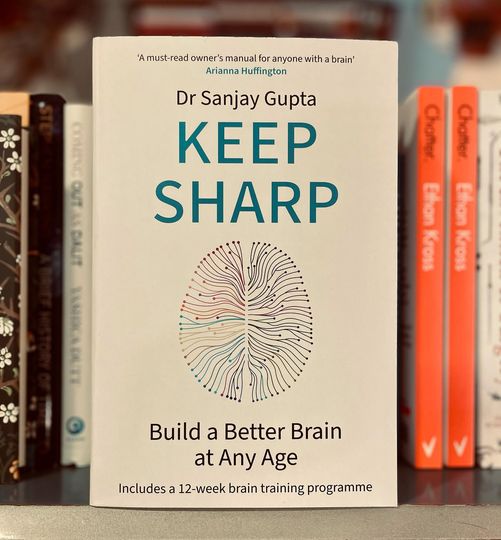In "Keep Sharp," neurosurgeon Sanjay Gupta debunks myths about age-related cognitive decline and offers practical strategies to maintain a sharp mind at any age. He emphasizes a holistic approach, addressing physical activity, brain stimulation, sleep, stress management, diet, and social connection.
Lessons from "Keep Sharp" by Sanjay Gupta:
1. Debunk Myths about Aging and Mental Decline: Forget the myth that cognitive decline is inevitable. "Keep Sharp" reveals that brain health is influenced by various factors and can be improved at any age.
2. Brain Health is a Team Effort: No single factor determines brain health. A combination of physical activity, brain-stimulating activities, sleep, stress management, and a healthy diet plays a crucial role in maintaining cognitive function.
3. Exercise Your Body and Mind: Regular physical activity not only benefits your physical health but also improves blood flow to the brain, enhancing cognitive function. Engaging in intellectually stimulating activities like learning a new language, playing games, or reading keeps your brain engaged and helps create new neural connections.
4. Sleep is Essential for Brain Health: Prioritize quality sleep for optimal brain function. During sleep, the brain consolidates memories and removes harmful toxins, promoting cognitive health.
5. Manage Stress Effectively: Chronic stress can damage brain cells and impair cognitive function. Learn effective stress management techniques like meditation, yoga, or spending time in nature to optimize brain health.
6. Eat for Brain Health: Focus on a Mediterranean-style diet rich in fruits, vegetables, whole grains, and healthy fats. This diet provides the brain with essential nutrients required for optimal function.
7. Limit Inflammation: Chronic inflammation has been linked to cognitive decline. Manage inflammation by reducing your intake of processed foods, sugar, and saturated fats.
8. Social Connection Matters: Maintaining strong social connections can protect against cognitive decline and promote mental well-being. Engage in meaningful relationships with friends and family, and participate in social activities.
9. Brain Training Can Help: Consider incorporating brain-training exercises and games into your routine to help improve memory, focus, and cognitive flexibility.
10. Early Intervention is Key: Don't wait until you experience cognitive decline to start taking care of your brain health. Implement these strategies early in life for optimal brain health and cognitive function throughout your lifetime.
Bonus Lesson: Embrace a lifelong learning mindset. Continuously challenge yourself by learning new skills and exploring new experiences. This keeps your brain active and promotes cognitive growth.




